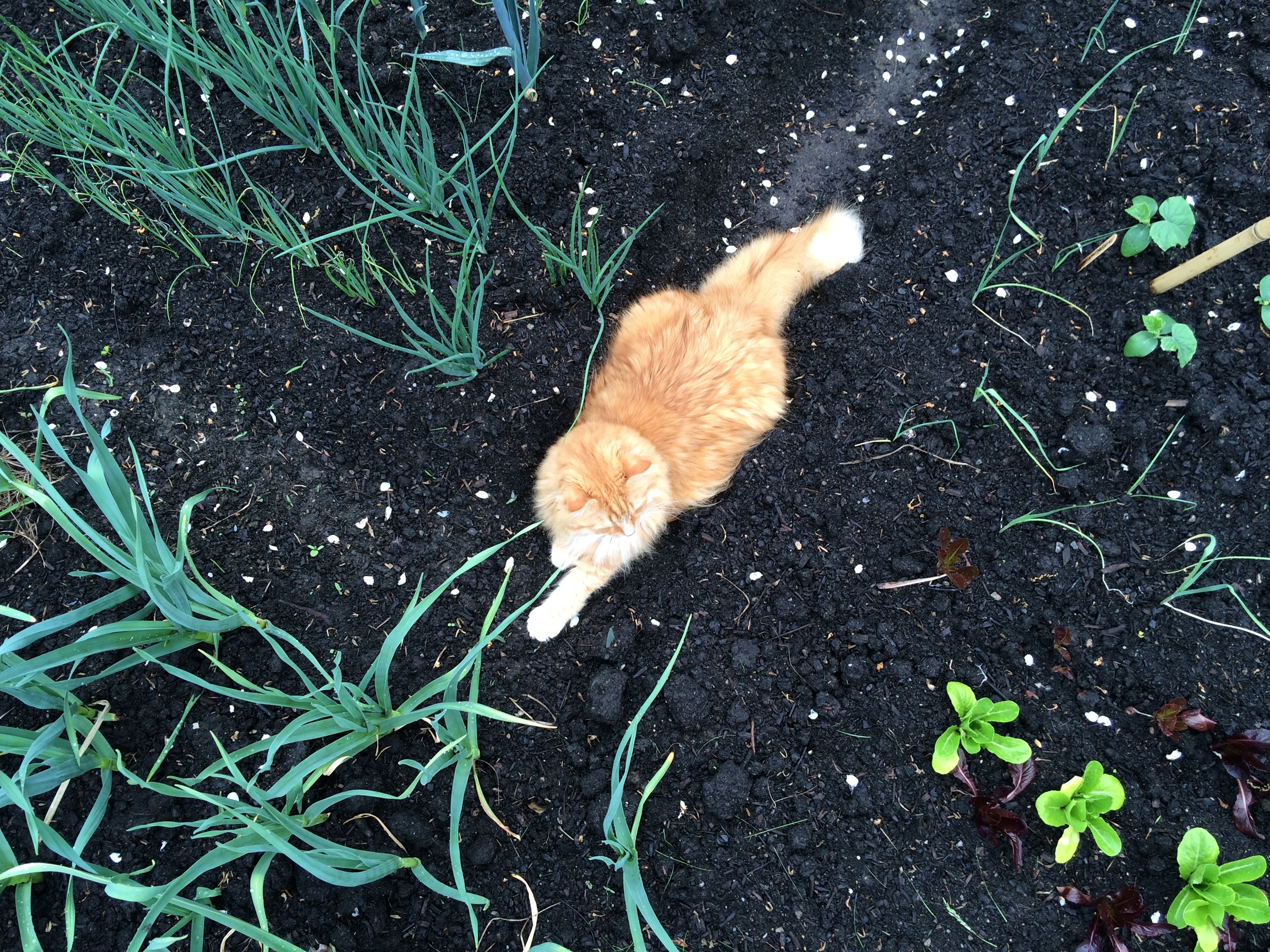“But, just why is it that 75% of us who exhibit this one behavior will most likely split up?”
Subtle superiority —better known as subtly dismissing or diminishing your partner— accumulates daily until the relationship breaks under it. Not even the angry, distant partner totally knows what bee exactly got in her bonnet. She just sort of knows that, well, "Hey, Babe, I'd rather be someplace else than with you."
Gottman's words dump a downer on me. Damn if I haven't been naively dissing my garden like an at-risk relationship that doesn't see it coming.
You could say my garden and I need a bit of counseling, and not by me.
If A Wheelbarrow Could Balk
This spring was not like any other. In previous seasons, enduring hours under the garden's sun, me primping every sprig and sprout, Tumbles would at last seek solace beneath the wheelbarrow, giving up any optimism of getting back indoors for a siesta.
Not this year.
This year, Tumbles can snooze beneath the soft shade of the indoor sofa's skirt all he likes; our garden scarcely ever sees us. I've been taking her for granted. No, worse, I've been dismissing her: "Dear garden, of course, your green-tea leaves are promising and the sage flowers, pure purple; they should be. But, what about. . ."
And, it's too true what Dr. John Stosny keeps trying to tell all of us. He says "most of us don't even notice our dismissive or diminishing ways."
"Really, lil garden, I can't see why you'd want to sprout a potato stalk in the middle of the pea patch?" (On an aside, this happens if a potato goes unseen and unharvested the year before.)
My garden wilts with a sigh.
And, there it is. It's that subtle. It starts by unconsciously supposing that your viewpoint, sensitivity, behavior or choice in shoelaces is better than that of your partner's.
“Most of us reading this think, “I don’t micromanage, judge, criticize, or critique my partner.””
The Sight of a Sigh
Most of us reading this think, “I don’t micromanage, judge, criticize, or critique my partner.” But, just to make sure, check it out with your partner. Don’t ask, “Do I nit-pick you?” That’s like asking, “Does bending down to weed make my butt look big?”
No one who values their life is going to give you a straight answer. Instead ask, “What are some of the ways I criticize or overlook you?”
“Or better yet: “If I ever make you feel bad, would you please point it out to me?””
Being aware of when we're being a prick of a rose-thorn allows us to apologize. This usually makes for an awkward exchange, but at least you won't be splitting up sixteen years from now.
Better yet, snag ourselves early enough and we can stop our tongues altogether. After all, believe it or not, we are not better than our partners, just different. (I know. Hard to believe.)
But, I Just Can't Help It
As a counselor, you'd think I'd know better, and I did hesitate—give me that much credit—yet, there I was again with my garden: "No, I didn't check the water-timer; it's no big deal. Don't make me out to be such a bad guy. You know my office-hours have gotten more demanding. Can't we talk about this later?"
Sighing some more, my garden dropped its lonely leaves to the ground.
Hardly a day will pass, and we’re destined to accidentally prick our partners. It's the leitmotif of relational strain. Our everyday theme! Just put yourself in the long, long, long list of daily ways, tallied at the end of this essay's ditty.
So, the point is not to not do it. Rather, it's like Dr. Patricia Love suggests, "The goal is to notice when we do 'do it' and to sincerely admit it to our partner."
Ideally, your peeved partner will go easy on you when you apologize. I hope so, because they will have their turn at getting it wrong too. (At which time, you’ll have compassion to go easy on them, right?)
"Okay, lil garden, so while I was away, you had a bad-ass bash with flea beetles; now, the cucumbers are hungover and the eggplants gone-zo. . ."
And, here comes the kazoo of compassion: ". . . I get it. It happens. I screw up, too."
Yes, for all the ways we accidentally diminish each other, the list is longer than Kentucky pole beans. But, worth a read. Often.
Unless you're ready for you and your garden to break up—and I'm not just yet.
Tumbles tends to the broccoli sprouts.
Back Of The Seed Packet
“
Ways We Diminish Our Relationship & Partners”
- Excluding the other from decisions: “I told my brother we would visit them this weekend.”
- Robbing the other of the opportunity to help (by over-functioning and over-doing): “Don’t bother. I got it.”
- Correcting what the other said: “It was last Wednesday, not Thursday.”
- Questioning the other’s judgement: “Are you going to cook those eggs one at a time?”
- Giving unsolicited, menial advice: “If you do it this way, it’ll go a lot faster.”
- Implying inadequacy: “I wish you had been at the workshop with me” (not because he/she would have enjoyed it, but because it would have ‘corrected’ some stuff not up to par in him/her).
- Making unrealistic demands of the other’s time and energy: “After you put the kids to bed and pay some bills, I want you to listen to how my day was, in detail.”
- Overreacting (which is a form of criticizing another’s choices or behavior): “I can’t believe you voted for him.”
- Ignoring the other’s needs (Basically sending the message that they’re not important): “It's no big deal that I do this; You're being controlling." Or, "You're not too tired; it'll be fun to have company over."
- Focusing on what he/she didn’t do, not what they did do: “It would have been better if you’d said ‘I’m sorry” to begin with.”
- Withholding appreciation: Thinking “Well, it’s his/her role in the family to xyz. So, why thank him/her.”
- Valuing other’s needs (including children's or work's) over your partner’s: “I couldn't say no to them.” (Kids can learn to tolerate life’s disappointments by observing and experiencing their parents choosing mommy or daddy more often. and, work colleagues can see how dignified and exclusive it is for you to choose going home to your partner more often.)
- Showing little interest or curiosity in the other’s interests: Silence; Use of smartphone in presence of the other, or flat out: “I can’t see what you see in that.” Or “Well, that’s your thing. Not mine.”
- Undercutting the other’s wishes. You're mindset is something like this: "I agreed I’d get home early tonight, but she wouldn’t say no if I told her the sports tickets were free." The honest way to do this is be direct: "I got these tickets, how upset would you be if I went. I know you asked if I’d come home early tonight.”
- Dismissing the other’s grievances. Thinking, “Okay, here we go again. I’m the bad guy.” (Point is to see that more is going on beneath the surface; i.e., your partner's wish for security, trust, etc.)
- Choosing friends over his/her company without checking in to see how he/she might feel or think.
- Interpreting the other: “What you really meant when you said you’re tired is that you don’t want to listen to me.”
- Psychoanalyzing: “You are trying to make up for your father...”
- Comparing: “The neighbor’s house is so much prettier.” Or, "Jake and Sarah go out at least once a week."
- Generalizing: “You always...” "You never..." "You barely..." “You wouldn’t understand.” etc, etc.
- Believing you know what’s best for the relationship: “If you’d only listen to me, I know about these things...” or “I’m with the kids all day so I know what they need...”
- Framing your expectations as rules or truths: “It’s really important that you join us for the afternoon.”
- Suggesting how the other should feel.
- Assuming they wouldn’t have ideas or interest about your area of expertise
- Assessing him/her by the same standards as you do your friends. (We don’t live with our friends.)
- Teasing the other’s efforts: “You're really having a tough time with that, aren't you.”
- Suggesting a “better way”: "If you..." "When I do it, I...", "Try it this way..." or “Why don’t you...”
- Casual Name-calling: “You’re so grumpy today.”
And, oh yeah! More ways:
- Criticizing in front of other people
- Not replying
- Not making eye-contact
- Rolling eyes
- Giving the look
- Walking away
- Using harsh tone to get through to your partner
- Pointing out what he/she is doing wrong
- Pointing out what he/she is not doing well enough
- Pointing out what he/she is not doing exactly as you’d like it done
- Being in a bad mood around your partner--but not your friends
- Expecting the other to match your level of energy and use of time
- Ignoring or condescending the other’s needs that you think are unimportant
- Sarcasm & Teasing


